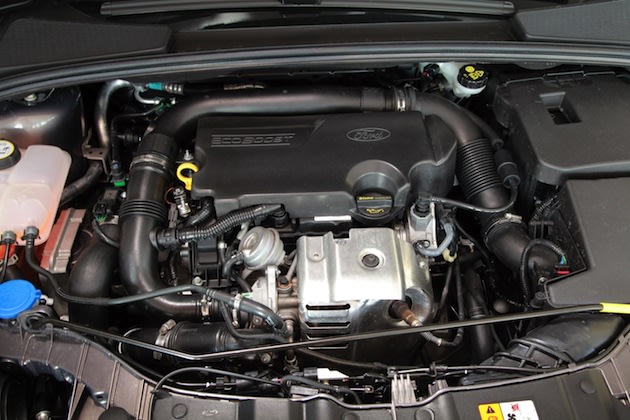The question today is about RON, what is it and what's the difference between 92, 95 and 97. RON is an abbreviation for Research Octane Number. The RON is determined by running the fuel in an engine with variable compression ratios and then comparing the results obtained with mixtures of iso-octane and n-heptane. In simple terms, the number after the RON denotes how well the engine copes with compression without detonating prior to ignition.
Ford's 1.0-litre EcoBoost engine has a high compression ratioDuring the four stroke cycle of a conventional petrol engine, one of the stages involves the compression process. During this phase the air and petrol mixture is injected into the chamber and the cylinder compresses it before ignition. Ignition is caused by a spark given out by the spark plug at the precise time for complete combustion. During compression itself, there is a tremendous build up of heat. Lower RON fuels aren't able to withstand high compression and tend to detonate before the actual spark causing 'knocking'.High compression engines require higher octane fuel or higher RON to stop engine 'knocking'. 'Knocking' causes adverse effects to engine components including severely damaging the cylinder head. Many modern engines are equipped with knock sensors, which sense the detonation of fuel before the actual spark and retard the timing to compensate for it.
Using lower RON fuels than stated by your manufacturer can spell disaster for your engine.So besides the knocking effect, is there a considerable difference between 92, 95 and 97? The answer can't be layed out in black and white. This is because higher octane fuel provides a considerable advantage to high performance and highly tuned vehicles. This is due to performance additives as well as higher compression. Vehicles such as the Mitsubishi Evolution 10 are high performance turbocharged cars that run very high compression ratios to perform at the optimum level. Therefore, cars like the Evo 10 can only run on a minimum of RON97 to produce the rated performance figures.
Fo us commoners, when we switched from 97 to 95 there may have been a slight performance drop, but was only noticeable during brisk acceleration and at high speeds. During city commutes, the difference can barely be felt. But if you do decide to jump to a lower grade fuel, check with your manufacturer before hand so you don't damage your engine.


No comments:
Post a Comment